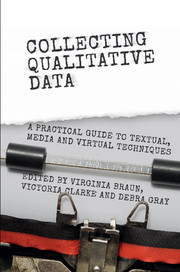Book contents
- Collecting Qualitative Data
- Collecting Qualitative Data
- Copyright page
- Contents
- Figures, Tables and Boxes
- Acknowledgements
- Contributors
- Foreword
- 1 Collecting Textual, Media and Virtual Data in Qualitative Research
- Part I Textual Data Collection
- Part II Media Data Collection
- Part III Virtual Data Collection
- Afterword
- Glossary
- Index
- References
Part II - Media Data Collection
Published online by Cambridge University Press: 06 October 2017
- Collecting Qualitative Data
- Collecting Qualitative Data
- Copyright page
- Contents
- Figures, Tables and Boxes
- Acknowledgements
- Contributors
- Foreword
- 1 Collecting Textual, Media and Virtual Data in Qualitative Research
- Part I Textual Data Collection
- Part II Media Data Collection
- Part III Virtual Data Collection
- Afterword
- Glossary
- Index
- References
Summary

Information
- Type
- Chapter
- Information
- Collecting Qualitative DataA Practical Guide to Textual, Media and Virtual Techniques, pp. 94 - 116Publisher: Cambridge University PressPrint publication year: 2017
References
Further Resources: Online
For more information about the ‘Everyday Coupledom’ project, see www.enduringlove.co.uk
The Association of Internet Researchers Ethical guidelines can be found here: http://aoir.org/reports/ethics2.pdf
The ReStore site offers material related to the assessment and development of new methods for the analysis of media content: http://www.restore.ac.uk/lboro/
Further Resources: Readings
References
Further Resources: Online
TuneIn is an Internet radio website that allows you to search for podcasts of particular TR shows. It provides a good way to find data or to get a feel for what TR feels and sounds like: http://tunein.com
Further Resources: Readings
References
Further Resources: Online
The Association of Internet Researchers (AoIR) has a useful website where researchers can subscribe to a free, open-access mailing list, download papers from the association’s annual conference, and access the AoIR Guide on Ethical Online Research: http://aoir.org
The Blog Analysis Toolkit is the University of Pittsburgh’s Qualitative Data Analysis Program – a free online system for researchers to capture, archive and share blog posts: www.ibridgenetwork.org/university-of-pittsburgh/blog-analysis-toolkit
The web resource ReStore provides online training resources for researchers. The section ‘resources for learners’ (www.restore.ac.uk/orm/learnerresources/) is particularly valuable, providing overviews of key journals and texts in the field of online research, a glossary, links, FAQs and bibliographies on online research methods, including blogs (see Bibliography section ‘online methodological futures’: www.restore.ac.uk/orm/learnerresources/bibliography.htm): Madge, C., O’Connor, H. and Shaw, R. (2006). Exploring online research methods in a virtual training environment: www.restore.ac.uk/orm/
Further Resources: Readings
References
Further Resources: Online
The website MOOD: The Microanalysis of Online Data is an international network of researchers from various disciplines who use methods such as conversation and discourse analysis to conduct ‘microanalysis’ of online data, including things like social media as well as discussion forums: (http://moodnetwork.ruhosting.nl/)
For another, more recent, scholarly network that offers a more linguistic orientation to discourse analysis, see http://adda.blogs.uv.es/
